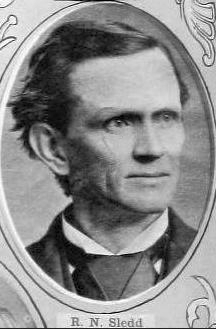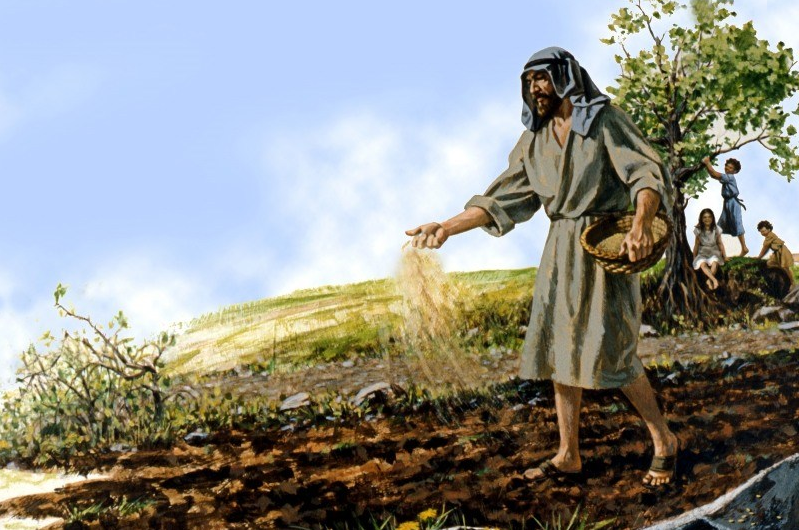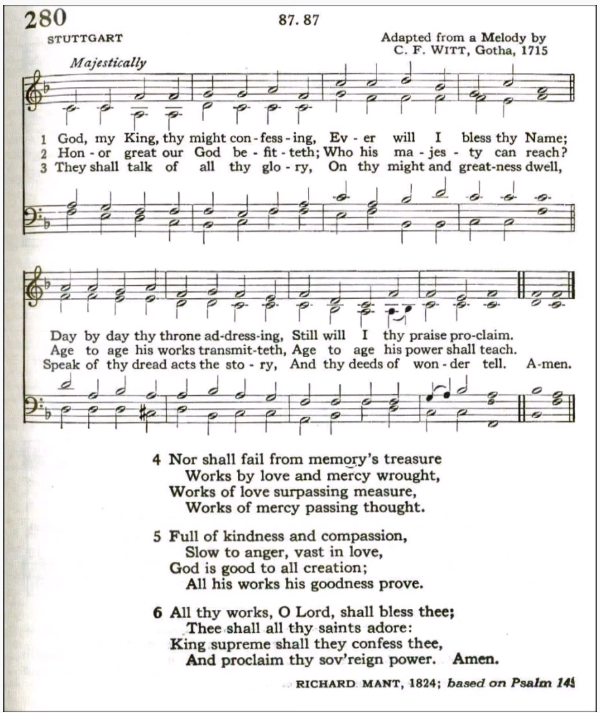Editor’s note: The following is extracted from True Heroism and Other Sermons, by R. N. Sledd (published 1899).
“And He said, ‘So is the kingdom of God, as if a man should cast seed into the ground; and should sleep, and should rise night and day, and the seed should spring and grow up, He knoweth not how. For the earth bringeth forth fruit of herself; first the blade, then the ear, after that the full corn in the ear. But when the fruit is brought forth, immediately he putteth in the sickle, because the harvest is come.'” — Mark iv, 26-29.
The gospel of Christ is represented in this parable under the figure of seed; and its method or order of procedure in the salvation of men under the figure of the process of nature in the germination of the seed, and the development of the future plant and its fruit.
There is in the seed an inherent vital principle or force.
It is this mysterious life-power that organizes and holds in combination the elements that make up the seed, and that prevents its dissolution and decomposition.
What this principle is as to its essence we do not know. We may magnify the seed to the highest possible degree; we may dissect it with the most delicate instruments that science can invent; but we will find ourselves wholly unable to detect that wherein its life consists. It has eluded every effort to detect it and to subject it to analysis and definition. But the fact that there is such a power in the seed, out of which the whole future life of the plant is evolved, no man will question for a moment.
In the gospel of Christ is a secret invisible energy — a principle of life — spiritual and eternal life. It is called “the incorruptible seed of the word of God which liveth and abideth forever.” It is not a dead letter. As a history of a divine-human person and his work, as a system of doctrine, and as a code of morals it is instinct with life. It is both vital and vitalizing. Wrapped up in it is the life of the church, and of every individual believer; and that life is vigorous and healthful, not according to outward and temporal conditions, but in proportion to the nutriment which it receives from the word.
It has sometimes happened that seeds have been preserved through a long period of time; but when planted they have germinated and reproduced themselves as readily and as perfectly as if they were the product of the last harvest. So the lapse of ages has not impaired in the least the vital force of the gospel. It is as quick and as powerful today as when first proclaimed by the newly inspired apostles on the streets of Jerusalem. The trees of the Lord are as green and flourishing, their blossoms are as beautiful and fragrant, and their fruits as abundant and perfect now, as were those that grew under the personal care and culture of the Master himself.
The seed reproduces itself. It brings forth fruit after its own and not after another kind. There is no such thing in the kingdom of nature as the transmutation of species. Each, while it may be improved, or may deteriorate, preserves its own essential characteristics to the end of its existence. And whatever the varieties of the soil in which the seed may be planted, or whatever the varieties of climate and atmospheric influences, the product, though perhaps in some respects modified, is essentially the same.
The gospel of Christ, itself unchangeable, produces the same results in all ages, among all men. There are endless varieties of character and condition among men — differences of capacity and acquirement, of modes of thought and habits of life, of disposition and taste. The influences that operate on them are as varied as their circumstances and associations. Yet everywhere the result is the same. While the gospel does not destroy the distinctive peculiarities of men, or exact from every one precisely the same exhibition of Christian character and life, its fruitage is everywhere identical. It is everywhere, “love, joy, peace, long-suffering, gentleness, goodness, faith, meekness, and temperance.” And in the production of these fruits it reproduces itself. Every Christian man’s life is an evangel, a proclamation and illustration of the truth and power of the gospel, and has in it a reproductive energy; so that it were possible for the gospel to perpetuate itself, work out its results, and achieve its triumphs in the world independently of these written records.
While the life-power in the seed is to us inscrutable, we can be at no loss in determining the source and secret of the vital force of the gospel. It presents those views of the divine character that naturally tend to re-awaken the soul’s confidence and love. It is the medium through which a divine influence is imparted to quicken the soul, to enlighten the understanding, awaken the conscience, renew the will and the affections, to reconcile us to God and bring us into a blessed fellowship with Him. To receive the gospel is to receive Christ: in its saving application it is “Christ in you the hope of glory” — Christ, not personally and locally, but in the fulness and richness of the gifts and graces of his Spirit which dwelleth in you.
The life of the seed is developed according to certain conditions or laws.
The law of fitness or adaptation. It will not germinate in a bank of snow, or of arid sand. It must be placed in a soil properly prepared and enriched, and withal naturally adapted to its growth. It must have the air, the sunshine and showers, in order to the evolution of its life-principle. So the word of God must be received and kept in a good and honest heart. The heart is its soil, and the only soil in which it will germinate and bring forth its fruit. “That on good ground are they, which in an honest and good heart, having heard the word, keep it, and bring forth fruit with patience.”
The law of progress. “First the blade, then the ear, after that the full corn in the ear.” There is a gradual unfolding of the spiritual life from its first pulsations in conviction to maturity in entire sanctification. There is a moment when the tender shoot first bursts through the soil into the sunlight; a moment when the blossom opens and sheds its pollen; a moment when the corn is ripe. So there is an instant of time when the soul first feels the quickening power of the Holy Ghost; an instant when it emerges from the darkness and sorrow of conscious guilt and penitence into the light and joy of conscious pardon and peace with God; an instant when with absoluteness of consecration and trust it comes into the experience of “the fulness of the blessing of the gospel of peace.” But as in the process of nature, so in the work of grace, however it may appear to outward observation, there are no sudden abrupt leaps from a lower to a higher state. The blade cannot at once become full corn; the little leaven cannot instantly leave the whole lump; the babe in Christ cannot at once become the full-grown strong man. There is a gradual advancement from one state to another — the soul as certainly passing through every state in its progress as the infant must pass through childhood and youth to reach manhood.
While the work of God in the soul is progressive, at every stage of its progress it is perfect. Is a man regenerated? In that moment he is a perfect babe in Christ — but nothing more than a babe, nor do we know of any scriptural doctrine, precept or promise, that justifies us in expecting him to be anything more at that time. Is that work sufficient for his salvation? If he were to die, the next moment after regeneration would he go to heaven? Beyond all question. He is as truly a child of God as he ever will be, and has as sure a title to the inheritance as he ever can have. There may be children of widely different ages, and different degrees of intelligence and usefulness in the household; but there is no difference in their relationship to the parents, nor in their claims to a share in the parental estate. The heavenly Father will give a crown and a kingdom to the feeblest of His children no less certainly than to the strongest.
But must not some additional work be accomplished in the soul? Is it made meet for the inheritance of the saints in light by regeneration only? So we have believed from the time we first gave the subject serious consideration; so we will continue to believe until we find something to the contrary in God’s word. We are not ignorant of human theories on the subject. We know that there is a very common notion that in the article of death there is an additional unconditional work of the Spirit completing the soul’s transformation into the image of God.
But if God can work such a change unconditionally in one, He can do the same in all; and if in any respect, then in every respect and to any extent. The logical outcome of such a theory is the abolition of hell and universal final restoration. It is enough that we find no intimation of any such work of the Spirit in the hour of death anywhere in the sacred Scriptures — no intimation that the grace imparted in regeneration is insufficient for salvation. We hope never to find any such intimation. The discovery would be a sad blow to our faith in the gospel.
But the man does not die as soon as regenerated — what then? The blade does not perish as soon as it reaches the sunlight — what then? Do we look for the full corn the next day, or the next? No; we are to protect and nourish the plant, let it have the light and warmth of the sun, the dews and showers, and careful culture, and in due season the ripe corn will be our reward. So the new-born child of God must have the nursing care of the church, the means of grace, and the sweet influences of the Spirit, that he may grow thereby into a mature Christian manhood. Under such fostering care and in the use of these means, he will “come unto a perfect man, unto the measure of the stature of the fulness of Christ,” as certainly as the plant under favoring conditions will be developed into a healthful maturity.
But what of sanctification? Is it not a grace distinct from regeneration — “a second blessing” — “or higher life” — to be attained and enjoyed at some point between the two states denoted by the blade and the full corn? We have not so read the Scriptures. We do not doubt that there is many a precious baptism of the Spirit between these stages of the spiritual life just as there is many a refreshing shower and many a day of sunshine between the bursting forth of the blade and the ripening of the corn. But our view of the matter is that the child of God enjoys the blessing of sanctification from the moment of his regeneration on through life until he is glorified in heaven; not the blessing in all its fulness; and yet the blessing in its fulness as measured by his ability to receive and enjoy it. The state of the soul when born anew is one of consecration to Christ, of trust in Him, and love for Him, proportioned to the clearness of its view of its own need and of His sufficiency. Its conception of its need is constantly enlarged and intensified by the discipline of life and its increasing knowledge of itself, while the study of the word and the experience of the heart are ever giving it deeper and more comprehensive views of the unsearchable riches of Christ. With its growth in knowledge of itself and of Christ, and a corresponding appropriation by faith of His atoning merit, there is growth in purity, love, joy, peace, and all the graces and fruits of the Spirit. Through this entire process the soul is in a state of salvation, sanctification, holiness, according to the degree of its light and the measure of its present capacity. The life, therefore, from its beginning to its culmination in glory is one — and one forever — a new and “higher life” as compared with the old life of sin, it is true, but not in the sense that it is essentially different from itself at different stages of its progress.
This view may help to explain a not uncommon fact in the history of individual Christian life. We know persons who, years ago, professed entire sanctification, but who do not profess it now. Why not? Have they fallen away? No; they are as devoted, earnest, faithful now as they were then. They will perhaps say that they have lost that blessing. We think differently. Instead of losing it they have outgrown it as then enjoyed. They are on a higher plane of knowledge and have broader and more comprehensive views. What filled the soul then cannot fill it now. The joy of childhood and youth is wholly insufficient for their manhood. If, instead of mourning over it as lost, they will trustingly appropriate Christ’s saving and sanctifying merit up to the measure of their present knowledge, the vessel, however capacious, will be filled again, and to overflowing.
Is this Methodist doctrine? We believe it to be Bible doctrine. We believe, too, that we have not advanced an idea that is not involved in the often quoted saying of Mr. Wesley that “regeneration is sanctification begun.” All the elements of a completed sanctification are in regeneration; and while a man may profess entire sanctification today and claim that it has all been done for him and in him by the Holy Spirit in an instant, Mr. Wesley says: “You are mistaken; it was begun in you ten, twenty, forty years ago, when you were regenerated.” What ever else Methodism may teach, it emphasizes the doctrine of growth in spiritual life. It affixes no limit to this growth. It sets no time at which a man may say, “I have ‘already attained’ and am ‘already perfect,'” but exhorts every man to be ever “following after, if that he may apprehend that for which also he is apprehended of Christ Jesus.”
Many a plant springing from a good seed never reaches maturity. It is destroyed by the worm, nipped by the frost, or choked by the weeds. So little sins, great sins, worldliness, lust, pride, ambition, often dwarf and disfigure the spiritual life, arrest its progress, and ultimately destroy it. “He that hath ears to hear, let him hear.”
Unlike the seeds of nature, the seed of the word of God is incorruptible. It “liveth and abideth forever.” In it is the power of an endless life. Its fruits are perennial. The saints in glory are forever moving onward and upward to a higher and grander perfection.











Amen. Praise Jesus.